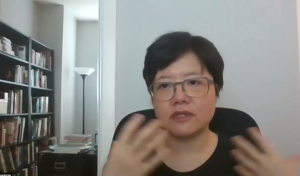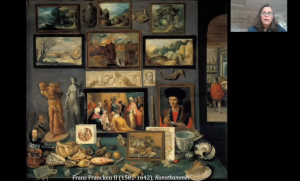By Susan Douglass
The month following Georgetown’s campus closure in March was filled with postponements, then cancellations, of planned spring education outreach events. We instead put our efforts into updating the Education Outreach resources pages of the CCAS website with new and revised curriculum materials. As it became clear that the lockdown would be extended, events were again taken up, with an eye toward developing models for conducting events virtually. We hosted a webinar on the newly updated Islamic Spain website for more than 90 attendees and the virtual museum tour and workshop “Caravans of Gold, Fragments in Time” on West Africa in partnership with Howard University and the National Museum of African Art. Rather than 25 attendees, which would have been the maximum number the museum could have hosted on an exhibit tour, 127 participants joined us online.

Our virtual model had to be ambitiously extended so that we could still hold our “Summer Teacher Institute 2020: Connected Histories of the Renaissance” the first week of August. Conducted in partnership with the Alwaleed bin Talal Center for Muslim-Christian Understanding (ACMCU), the week-long summer institute hosted daily totals of 50-60 virtual attendees. Digital syllabi and readings, and pre-recorded lectures were made available to registered attendees in mid-July. During the week of the institute, we held two daily synchronous sessions featuring live discussions with the speakers, art exhibit viewings, and guided engagement with the teaching materials.
We were excited to attract for the summer institute a lineup of wonderfully generous scholars from the disciplines of history, literature, music, and fine art, especially since the lockdown had also interrupted these scholars’ summer plans. Their talks demonstrated that the Renaissance should no longer be taught as a mainly European phenomenon. They illustrated how the Renaissance expressed the growing connectedness of Europe with the globe, opening new worlds of ideas and culture. Travelers from many walks of life and geographic origins moved over land and sea, carrying foods, clothing, and technologies, which changed the way they viewed themselves and the earth itself. Inspired by Sanjay Subrahmanyam’s concept of “connected histories,” teachers and scholars explored topics that illustrated the impact of movement on a global scale.
We often hear of the “Zoom fatigue” that teachers are experiencing. Yet we found, to the contrary, that teachers were attending online outreach events in search of knowledge, ideas, and camaraderie during the difficult period of physical isolation. Dedicated attendees came online twice a day during the week-long institute and engaged in intense discussions with the scholars, demonstrating that they had engaged with the lectures and readings. There were also rich discussions surrounding their ideas on ways to support their students’ emotional, as well as intellectual, needs.

By the end of the summer, we had planned a full roster of fall-semester events to take place virtually, including the launch of a Secondary Education Module for the Middle East Studies Pedagogy Initiative, a pair of workshops on children’s and youth literature for the College of Education at Virginia State University, and conferences for the U.S. Department of State, the National Council for the Social Studies, and others. As a serendipitous result of the pandemic, the Title VI National Resource Centers’ outreach professionals have banded together for monthly meetings to share upcoming events, offer co-sponsorships, and exchange speakers. Everyone reports expanded attendance and engagement beyond their usual local participation. We hope to carry the momentum of collaboration forward, utilizing the new virtual structures—put into place out of necessity—to forge better outreach programs in the future.
Visit the CCAS YouTube channel to view videos from the 2020 Summer Teacher Institute or to find past education outreach events.
Dr. Susan Douglass is the K-14 Education Outreach Director at CCAS and ACMCU.